The Nano DSC utilizes capillary cells to achieve highest sensitivity and maximum sample flexibility.
Sales Promotions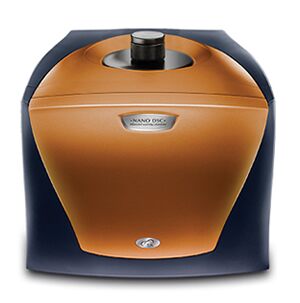
| Temperature Range | -10 °C to 130 °C |
| Scan Rates | 0.001 °C to 2 °C/min |
| Short-term Noise | 0.015 µWatts |
| Baseline Repeatability | 0.028 µWatts |
| Cell Configurations | Fixed Capillary / Cylindrical |
| Cell Materials | Platinum / Gold |
| Response Time | 5 sec |
| Active Cell Volume | 300 µL / 330 µL |
| Required Sample Volume | 500 µL / 450 µL |
| Pressure Control | Built-in 0 to 6 atmospheres |
| Heat Measurement Type | Power Compensation |
| Automation Specifications | |
| Sample Capacity | 2 standard 96-well plates, 490 µL/sample, 800 µL/reference |
| Sample Tray Temperature Range | Ambient to 4 °C |
| Wash / Rinse Solvent Ports | 5 on side of autosampler |
| 2 for autosampler syringe |
Innovative capillary design
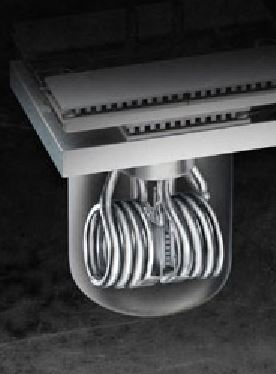 Innovative Capillary Design
Innovative Capillary Design
Innovative capillary design attenuates the onset of sample aggregation until after unfolding is complete.
Solid-state thermoelectric elements
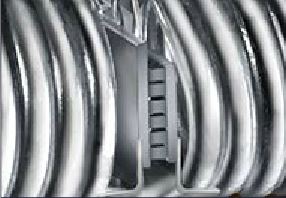 Solid-State Thermoelectric Elements
Solid-State Thermoelectric Elements
Solid-state thermoelectric elements deliver accurate and precise temperature control of the sample.
Reliable autosampler
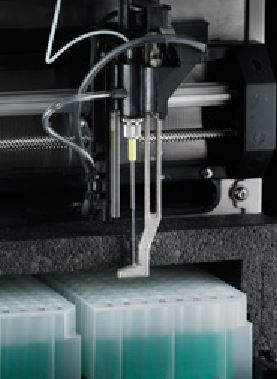 Reliable Autosampler
Reliable Autosampler
Reliable autosampler for increased productivity and true “walk-away” automation.
Protein required for DSC scan
Protein required for DSC scan
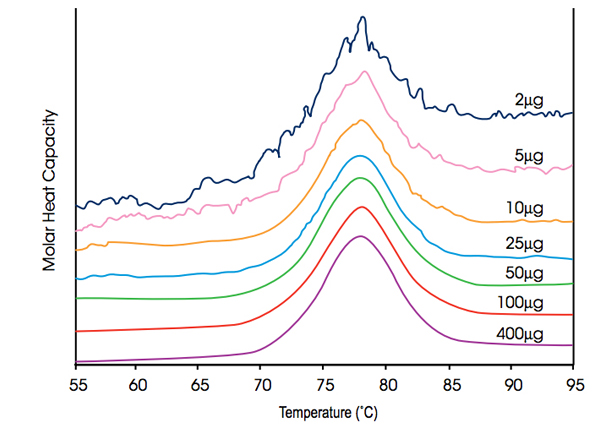
The Nano DSC delivers superior high sensitivity and reproducibility of data. Using the Nano DSC requires as little as 2 micrograms of protein, with quantitative results identical to experiments using 100 times more sample!
Protein Stability
Protein Stability
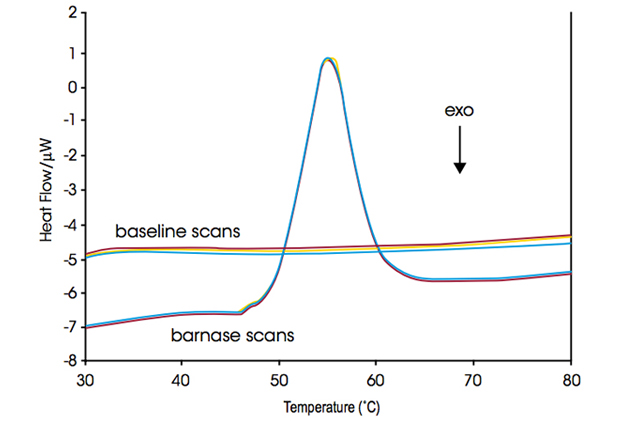
Nano DSC is ideal for accurate and precise measurements of protein stability. Unmatched repeatability of the heat flow baseline allows for the measurement of denaturation and partial molar heat capacity of proteins in very dilute solution.
Autosampler Productivity & Reproducibility
Autosampler Productivity & Reproducibility
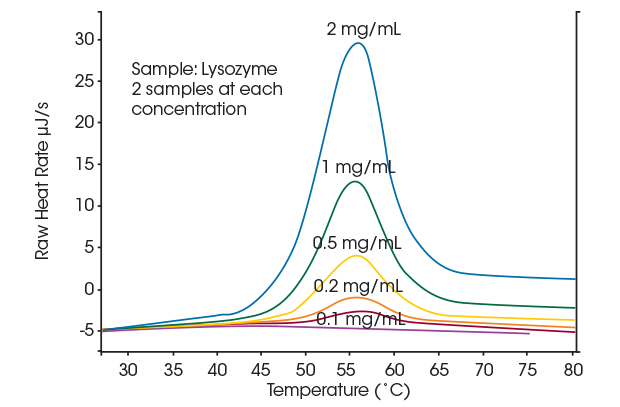
The Nano DSC autosampler provides high sample throughput. With automated, unattended sample handling it is true “walk-away” automation. The high sensitivity and superior baseline stability allow scientists to work at low protein concentrations. Automated wash and rinse cycles eliminate the possibility of cell contamination. This data shows the high sensitivity and excellent reproducibility obtained by the auto Nano DSC on samples of different concentrations.
- Nano DSC Brochure
- Pressure Perturbation Calorimetry- Data Collection and Fitting
- Determining Thermal Stability of Antibodies with a Nano DSC
- Buffer Compatibility with Nano DSC
- Benchmarking the Performance of the Nano DSC Against Competitive Units
- Advantages of Nano DSC when Studying Proteins that Aggregate and Precipitate
- Learn more about our superior cell design!
- Nano DSC for Protein Stability
- True Walk-Away Automation
- The Nano DSC – Biologic Thermostability, Simplified
- Webinar: Thermodynamic Parameters in Drug Development – J. Ladbury
- Webinar: Plasma Protein Calorimetry for Clinical Diagnostics – N. Garbett
- Description
-
Nano DSC is a high-resolution method for quantifying the thermal stability of large biomolecules and biotherapeutics. This instrument measures the heat of reaction from tertiary and secondary structure changes that occur when a biomolecule unfolds, or melts in the case of nucleic acids and lipids. The Nano DSC provides peak temperature when unfolding occurs and a total heat from the unfolding event.The Nano DSC is a highly sensitive differential scanning calorimeter for testing liquid samples containing a biomolecule or biotherapeutic sample. The unit is software controlled and experiments are set up, so that a sample is heated at a controlled rate over a defined temperature range. The Nano DSC can be automated to deliver samples directly from temperature-controlled 96 well plates, for unattended use. Automated cleaning eliminates sample carryover effects, and automated sample loading ensures the sample is delivered to the instrument the same way, every time.The Nano DSC allows researchers to characterize the thermal stability of their samples without the use of exogenous tags or dyes, thereby simplifying workflows and reducing errors in biopharmaceutical development. Researchers can rely on the measurement reproducibility and accuracy to ensure that material changes that may occur during manufacturing or storage are easily identifiable. The Nano DSC allows researchers to test their materials under their desired conditions, without reliance on manufacturer required reagents. In one experiment, the researcher can determine the melting temperature, enthalpy and heat capacity change, allowing them to calculate the free energy to make a fully informed decision on which formulation is most stable.
- Specfications
-
Temperature Range -10 °C to 130 °C Scan Rates 0.001 °C to 2 °C/min Short-term Noise 0.015 µWatts Baseline Repeatability 0.028 µWatts Cell Configurations Fixed Capillary / Cylindrical Cell Materials Platinum / Gold Response Time 5 sec Active Cell Volume 300 µL / 330 µL Required Sample Volume 500 µL / 450 µL Pressure Control Built-in 0 to 6 atmospheres Heat Measurement Type Power Compensation Automation Specifications Sample Capacity 2 standard 96-well plates,
490 µL/sample, 800 µL/referenceSample Tray Temperature Range Ambient to 4 °C Wash / Rinse Solvent Ports 5 on side of autosampler 2 for autosampler syringe - Technology
-
Innovative capillary design
 Innovative Capillary Design
Innovative Capillary DesignInnovative capillary design attenuates the onset of sample aggregation until after unfolding is complete.
Solid-state thermoelectric elements
 Solid-State Thermoelectric Elements
Solid-State Thermoelectric ElementsSolid-state thermoelectric elements deliver accurate and precise temperature control of the sample.
Reliable autosampler
 Reliable Autosampler
Reliable AutosamplerReliable autosampler for increased productivity and true “walk-away” automation.
- Experiments
-
Protein required for DSC scan
Protein required for DSC scan

The Nano DSC delivers superior high sensitivity and reproducibility of data. Using the Nano DSC requires as little as 2 micrograms of protein, with quantitative results identical to experiments using 100 times more sample!
Protein Stability
Protein Stability

Nano DSC is ideal for accurate and precise measurements of protein stability. Unmatched repeatability of the heat flow baseline allows for the measurement of denaturation and partial molar heat capacity of proteins in very dilute solution.
Autosampler Productivity & Reproducibility
Autosampler Productivity & Reproducibility

The Nano DSC autosampler provides high sample throughput. With automated, unattended sample handling it is true “walk-away” automation. The high sensitivity and superior baseline stability allow scientists to work at low protein concentrations. Automated wash and rinse cycles eliminate the possibility of cell contamination. This data shows the high sensitivity and excellent reproducibility obtained by the auto Nano DSC on samples of different concentrations.
- Resources
-
- Nano DSC Brochure
- Pressure Perturbation Calorimetry- Data Collection and Fitting
- Determining Thermal Stability of Antibodies with a Nano DSC
- Buffer Compatibility with Nano DSC
- Benchmarking the Performance of the Nano DSC Against Competitive Units
- Advantages of Nano DSC when Studying Proteins that Aggregate and Precipitate
- Learn more about our superior cell design!
- Nano DSC for Protein Stability
- True Walk-Away Automation
- The Nano DSC – Biologic Thermostability, Simplified
- Webinar: Thermodynamic Parameters in Drug Development – J. Ladbury
- Webinar: Plasma Protein Calorimetry for Clinical Diagnostics – N. Garbett













